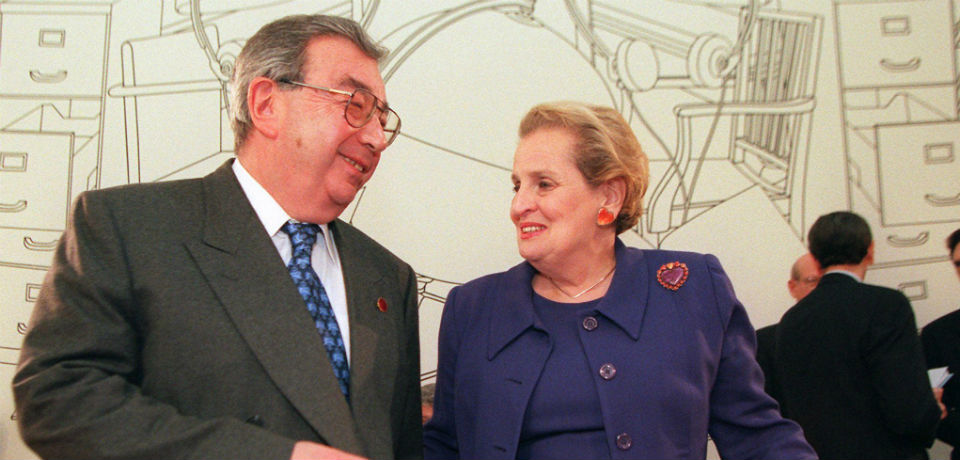A statesman from a time when the United States and Russia could disagree and still be friends.
Given my previous job, you do know that I know everything about you.” Those were the first words that Yevgeny Primakov said to me when I walked into his office in the Russian Foreign Ministry on my first visit to Moscow as secretary of state. He was, without a doubt, referring to his time as the head of Russia’s foreign intelligence service, the successor to the KGB.
My last conversation with him was several months ago when we spoke on the phone. He was ill, but alert, according to Foreign policy.
“I am so worried because Russian-American relations are as bad as I have seen in a long time,” he said. I agreed.
“I am so worried because Russian-American relations are as bad as I have seen in a long time,” he said. I agreed.
In the 18 years between these two conversations, we had dozens of meetings in Moscow, Washington, Geneva, Brussels, New York, Kuala Lumpur, and Manila. One of the most memorable was in St. Petersburg during the White Nights, when he gave me a private tour of the incomparable Hermitage Museum.
Yevgeny and I were counterparts during a remarkable time when the United States and Russia were working to develop a viable post-Cold War relationship. We spent a lot of time on the Middle East, an area where he was an expert, talking about what to do about Iraq and Iran. We spoke about other global challenges such as Afghanistan, China, and North Korea.
Obviously, the most complicated discussions had to do with Russia’s relationship with a new NATO. The Clinton administration’s goal was to proceed with the enlargement of NATO to Central and Eastern Europe, including the Baltic states, while minimizing Russian heartburn. In our first conversation, Yevgeny told me forcefully that Moscow could never agree to NATO enlargement. I told him he should regard it as a way to ensure stability in Europe, something that was in Russia’s interests.
The challenge was bridging the divide between our approach to post-Cold War European security and Russia’s. To that end, Yevgeny and I spent many hours working out the language for a NATO-Russia charter that would give Moscow a voice but not a veto in European security discussions.
Many of these discussions took place at official meetings, where we had interpreters, but they continued over dinner, where we dispensed with the translation. Yevgeny would speak Russian and I would speak English. These dinners took place in our respective homes and at our favorite restaurants. I recall a time when I had wanted to invite him to my home for dinner but could not because termites had devoured parts of my dining room floor. Instead, Deputy Secretary of State Strobe Talbott hosted us at his house. The conversation was direct and lively. We talked about the tendency of our respective bureaucracies to whittle away understandings we were able to reach when talking directly. From then on we had our own code when staff was undoing our agreed-upon language — we would just say “termites.”
Eventually we were able to reach an agreement on the NATO-Russia Founding Act. But from the first time we sat at the same table at a NATO meeting, it became clear that no matter what was signed, we would see that key agreement differently.
We also disagreed mightily on Bosnia and Kosovo, and we dealt with the subject even when he became prime minister. When the decision was made to move ahead with military intervention in Kosovo, Primakov was on his way to Washington; Vice President Al Gore informed him by phone, and Primakov was so furious that he ordered his plane to turn around and fly back to Moscow.
Foreign ministers are often asked to do many things that do not come in the job description. One of them is to perform in a skit at the ministerial meeting of the ASEAN Regional Forum. During the first meeting we participated in, in 1997, Primakov had led a skit but had not sung. The following year, I convinced him to join forces with me for a duet. In between difficult discussions on the Balkans and Iraq, we came up with our version of West Side Story. We called it the “East-West Story.” We wrote the lyrics together and rehearsed with a lot of vodka. When it came time to perform, I entered the stage and sung out: “The most beautiful sound I ever heard — Yevgeny, Yevgeny, Yevgeny.” He returned in his thick Russian accent, “Madeleine Albright — I just met a girl named Madeleine Albright.” We were a hit.
When I first met Yevgeny in 1997, I said, “I know you are a fierce defender of Russian interests. You should understand that I intend to be equally fierce in defending American interests. If we both acknowledge that, we should get along fine.” We did.
Yevgeny Primakov was always a staunch protector of Russian national interests. He loved his country. Yet he was pragmatic. He believed in the importance of solving difficult issues in U.S.-Russian relations. I miss that time. I will miss him.
M. Wassouf

